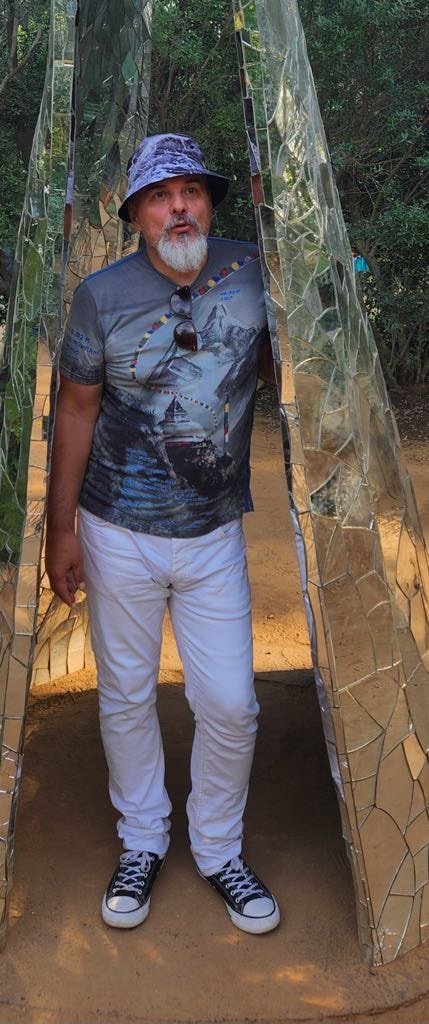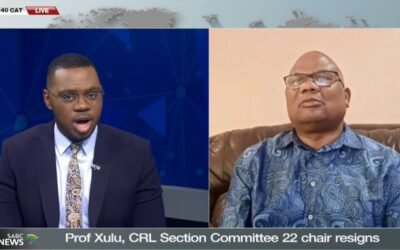Czech judges finally ruled, defeating a stubborn prosecutor, that Jára and his co-worker Barbora Plášková should be freed from jail.
by Massimo Introvigne

Numerous articles have been published in “Bitter Winter” and the scholarly “The Journal of CESNUR” about the Czech spiritual leader Jaroslav Dobeš, known to his followers as Guru Jára, stigmatized by Czech and international media as a “sex guru.”
In fact, his teachings on the Tantric path encompass more than just erotic practices. Erotic topics are rarely the focus of his courses but are those who led to his legal prosecution. One particular practice he advocates, known as “unhooking,” is said to free female followers who seek it from the detrimental ties of previous sexual relationships. According to Jára, “unhooking” transforms the energetic consequences of their sexual history. Typically, their past sexual history is “deleted.” This is achieved through a ritual that involves intercourse (without ejaculation) with Jára.
Numerous articles we published detail the experiences of hundreds of women who underwent the “unhooking” process. Many of these women, some of whom I and other researchers personally interviewed, recounted the process as an empowering and freeing journey. However, a handful reported feeling mistreated, triggering a sequence of occurrences that we have meticulously chronicled in our earlier publications.
Condensing the narrative into a brief overview, we encounter two conflicting accounts. From the perspective of Guru Jára and his followers, the accusations are merely the resentments of a few former members, whose claims are contradicted by the positive testimonies of numerous adherents who share a vastly different experience with the group and its practices. On the opposing side, critics, journalists, creators of a slanderous television miniseries on the subject, the prosecuting attorney, and ultimately the Czech judiciary, have determined that, for some women, the rituals conducted by Jára constituted sexual abuse. Consequently, Jára and his principal associate, Barbora Plášková, received prison sentences of five and a half years and five years, respectively.
The topic of spiritual groups that advocate sacred eroticism is invariably sensitive. I will refrain from reiterating my and others’ skepticism regarding the Czech verdict’s impartiality here. Those who are curious about this matter are encouraged to consult our previously published studies for more information.

This article is about more recent and positive developments. When Jára and Barbora were sentenced, they were not present in the Czech Republic but were in the Philippines, imparting teachings to followers from different nations at their community’s ashram in Siargao. Following demands from Czech officials, their arrest came in 2015. They contended that the Czech ruling was influenced by political motives and thus sought asylum in the Philippines. While awaiting the asylum decision, they were confined in the Bagong Diwa Immigration Detention Center near Manila, a facility criticized by international NGOs for its unsanitary and perilous conditions. Plášková faced the hardship of being separated from her infant son, who was also in the Philippines; she was permitted only two visits with him throughout an eight-year detention period.
On December 15, 2015, the Philippine Department of Justice declined the asylum request of Dobeš and Plášková. Subsequent appeals to the Office of the President were also dismissed on August 1, 2017, and June 4, 2021, leading them to seek a review from the Supreme Court. By 2023, the situation at the Bagong Diwa facility had worsened due to the presence of violent Japanese offenders who intimidated other detainees and continued their criminal activities from within. The Filipino authorities, seeking to address the mounting media scrutiny, decided to repatriate the non-Japanese detainees. Consequently, Guru Jára was surrendered to Czech officials and extradited to Prague via Taiwan. Barbora’s arrival in Prague followed. The Czech police hailed this as a significant achievement, though it was a response to domestic issues within the Philippines.

Jára was incarcerated in Prague on August 9, 2023. Despite his five-and-a-half-year sentence in the Czech Republic, he had already endured more than eight years of detention in the Philippines under deplorable conditions, as documented by humanitarian groups. His attorneys claimed that this duration should be credited against his Czech sentence, warranting his release, a principle that should apply to Barbora as well but was opposed by the state prosecutor.
The matter came before the Regional Court of Brno, which ruled on October 5, 2023, in the case of Jára and on October 11, 2023, in the case of Barbora. The court decided that the time spent in detention in the Philippines should be counted against the Czech sentences, as their attorneys had requested, and set the defendants free.
On October 23, 2023, the state prosecutor appealed. On December 14, 2023, the Court of Appeals of Olomouc decided to annul both resolutions and sent the matter to the Zlín branch of the Regional Court of Brno to be examined again. The Court of Appeals of Olomouc asked to clarify whether Jára and Barbora were detained in the Philippines simply for the violation of domestic Filipino immigration laws or because the local authorities had been informed of their criminal prosecution in the Czech Republic. Obviously, this required communication with the authorities in the Philippines.
On July 8, 2024, after six months of correspondence with Filipino authorities, the Zlín branch of the Regional Court of Brno rendered its decision. It stated that according to the information received from the Philippines, the detention of Jára and Barbora “was not caused by domestic [Filipino] acts of violation of criminal or civil laws; it was based on the notification of the Embassy of the Czech Republic in Manila that they were fugitives in their country of origin. Out of diplomatic courtesy [since there was no formal extradition treaty between the Philippines and the Czech Republic], the [Filipino] Immigration Office granted the request for cooperation, declared them undesirable, and proceeded to locate and imprison them.”
It was thus clear that Jára and Barbora were detained in the Philippines not for the violation of Filipino immigration laws but because of the criminal prosecution in the Czech Republic and the actions of the Czech Embassy. The question raised by the Court of Appeal of Olomouc was thus answered, and the Zlín branch of the Regional Court of Brno confirmed that the time spent in detention in the Philippines should be counted against the Czech sentence, with the consequence that Jára and Barbora should be set free.

On July 18, 2024, the state prosecutor appealed again to the Court of Appeals of Olomouc. There were no new facts in the prosecutor’s appeal and the questions that needed clarification in the Philippines had been clarified. The prosecutors, however, as they did since the beginning of Jára’s legal saga, were skilledly using the “court of public opinion,” and several media continued to depict Jára and Barbora, as did the infamous TV series, as dangerous “cult leaders.”
It is clear that some media, the anti-cultists, and the prosecutor were less interested in serving justice than in destroying the Guru Jára Path as a spiritual movement. As it happened with other groups teaching sacred eroticism, some perceived the combination of eroticism and spirituality as intolerable. On the other hand, it is possible that the advent of a new and more liberal President in the Czech Republic in 2023 and the government’s efforts to fully align the country with the democratic principles of the European Union opened the way to a fair solution of the case.
The fact that on August 28, the Olomouc judges, with a final verdict, put an end to the prosecutor’s obnoxious legal obstinacy and confirmed the decision of the Zlín branch of the Regional Court of Brno is a step in the right direction. Hopefully, Guru Jára and Barbora Plášková will now be free to resume their activities as spiritual teachers.

Massimo Introvigne (born June 14, 1955 in Rome) is an Italian sociologist of religions. He is the founder and managing director of the Center for Studies on New Religions (CESNUR), an international network of scholars who study new religious movements. Introvigne is the author of some 70 books and more than 100 articles in the field of sociology of religion. He was the main author of the Enciclopedia delle religioni in Italia (Encyclopedia of Religions in Italy). He is a member of the editorial board for the Interdisciplinary Journal of Research on Religion and of the executive board of University of California Press’ Nova Religio. From January 5 to December 31, 2011, he has served as the “Representative on combating racism, xenophobia and discrimination, with a special focus on discrimination against Christians and members of other religions” of the Organization for Security and Co-operation in Europe (OSCE). From 2012 to 2015 he served as chairperson of the Observatory of Religious Liberty, instituted by the Italian Ministry of Foreign Affairs in order to monitor problems of religious liberty on a worldwide scale.



